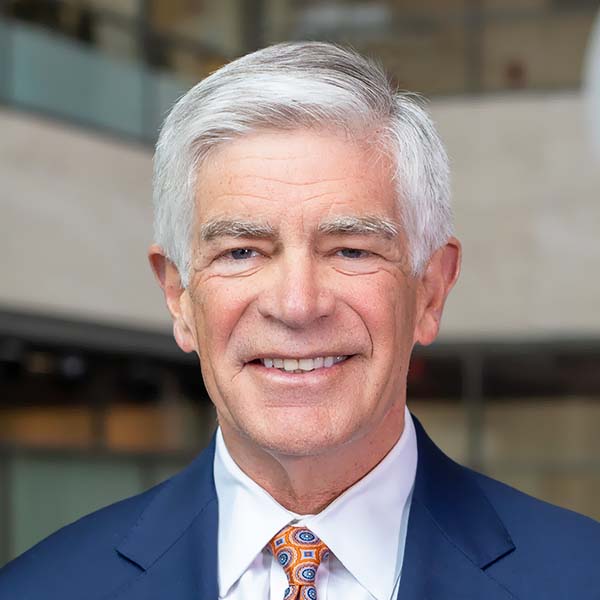Hello Stonier, and congratulations! It’s great to be in front of this group again. For those of you who don’t remember, I delivered the welcome address when you started this program three years ago. I certainly understand if you’ve forgotten because a lot has happened since June 2016. A lot.
In the intervening years, we’ve all had an education — you’ve mastered the intricacies of high-level banking management; I learned from a crash course in monetary policymaking; and we all finally, finally learned what it feels like to win a Super Bowl …
So I’m very pleased to bring this full circle and see you receive your diplomas.
The first order of business today is to give yourselves a round of applause. I like to do that because it’s important to recognize hard work, and because it guarantees people will clap at least once while I’m on stage.
The second order of business is another round of applause to the people whose support helped make this day happen … the friends, family, and faculty here today.
Fantastic! Now you’ve clapped twice while I was up here.
The third order of business is a few words about the importance of what you learned here at Stonier, and what it means when you apply it in the professional world.
The fourth is getting the actual diplomas, which is the most important, so I’ll keep the third part shortish.
The financial industry is only going to get more and more complicated and more and more complex, particularly in this current age of technological innovation. I say “current age” because of course, technology is always evolving and has already had several “ages,” as it will in the future.
In this iteration, financial institutions face challenges from cybersecurity to the rapid expansion of fintech.
We’re going to need people at the helm with an extraordinary set of skills, because financial institutions are important. And they’re always going to be important, because a financial system is fundamental to the human experience as we know it.
I’m not saying that as some sort of consumerist rallying cry; it’s the simple fact of our existence. Financial systems have existed in some form across human history.
From the barter system to banking, societies spanning time and space have found ways to execute the basic functions of payments, finance, and credit. It’s how we’ve amassed the things we need to live and the things we crave for comfort.
From the central agora to apps on our phones, whether it’s a creditor’s note or a series of 1s and 0s, the essentials of the system have stood the test of time. Each individual system, of course, has not necessarily been so lucky.
But that’s important, too. Because just as history illustrates that we’ll always find our way back to those systems, it shows what it takes for those systems to last.
It takes trust.
A financial system can only exist if we collectively agree to it. That takes an act of faith. A system of savings, credit, exchange, and investment only survives because we have trust in people we don’t know, currency we have no individual control over, payment systems with inner workings we can’t see, and institutions we grant power to — both to execute and to regulate those systems.
And since a strong and sound economy can only exist when it’s underpinned by a strong and sound financial system, the people who run those institutions have a unique responsibility.
So, you know, no pressure.
That responsibility extends to institutions of all sizes. Bigger organizations can have impacts that resonate on a national or even global scale. Smaller ones, particularly community banks, can be a lifeline for a community, and are a necessity for small, local economies’ survival.
Of course, you already know all this — I mean, you’re Stonier graduates, after all. But it’s a point worth repeating every once in a while, because that kind of responsibility doesn’t just require a mastery of balance sheets or investment acumen.
It calls for good leadership. And that’s something I know Stonier excels at.
When I spoke to you three years ago, I mentioned the importance of character. A lot may have changed in the intervening years, but that hasn’t. I don’t think it ever will.
There’s a narrative — and, yes, sometimes a culture — in financial services that says cutthroat is king. I’ve spent a lot of my time as a Fed president talking to the banking community, and what I’ve seen and heard from them is the same thing I’ve seen in every other aspect of my career: The most respected leaders are honest, authentic, and trustworthy.
Sure, there are outliers; bad people can thrive, and flashes in the pan can last longer than they should. But eventually, those people get found out. And in the long run, the most important asset any of us has — and the one thing in life we can control — is our integrity.
We don’t usually have a say in what life throws at us, but we do decide how we handle it. Our financial system needs people at the top who can roll with those changes and make the right calls, even when they’re the hard ones.
In the end, the financial system exists to perform some pretty basic functions: It keeps savings safe; ensures that we can easily price, buy, and sell things; and helps us direct resources to their best advantage. But what that actually means in our day-to-day lives is pretty huge: It’s how we get an education, or put a roof over our families’ heads. It’s how we start a business, or invest in our kids’ future. It’s how we get sustenance and fulfillment. There’s a lot riding on it, and a lot riding on the people who run it.
It’s a big job. It’s going to take some Stonier grads to do it right.
Thank you, and congratulations to everyone again.
The views expressed here are the speaker’s own and do not necessarily reflect those of anyone else in the Federal Reserve System.
View the Full Speech
